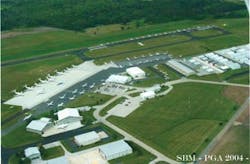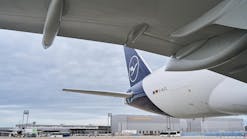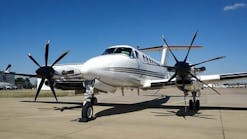SHEBOYGAN, WI — Come August, the Professional Golfers Association (PGA) Championship will return to the Whistling Straits golf course in Kohler, WI for the second time in six years. Coupled with that, the Sheboygan County Memorial Airport (SBM) will be handling traffic brought in by the inaugural NASCAR Nationwide Series race held at the Road America track in Elkhart Lake, WI. In preparation for these events, and continuing with work that began in the 1990s to expand the airport, officials are breaking ground on infrastructure upgrades.
Kohler’s Whistling Straits golf course drew worldwide attention as ‘one of the game’s most unique and challenging major venues’ when it played host to the PGA Championship in 2004, according to the golf association’s website. The 2010 event will be the 92nd staging of the year’s final major championship, slated to take place August 9-15.
Comments Chuck Mayer, county airport department manager, “We experienced some 1,200 operations in less than a week in’04.”
Mayer says Whistling Straits also played host for the U.S. Senior Open in 2007, adding, “This isn’t new to us, though the activity is overwhelming at times.
“The ‘04 championship was the big one; the Senior Open didn’t have quite the clout that the PGA Tour had, so numbers were down for that. If anything, we’re hoping for a bigger attendance in 2010 than the ‘04 event.
“As Kohler’s experience with marketing these events develops further, the turnouts should get better and better. The wild card is the current economic environment.”
Getting prepared
According to Mayer, fuel supplier Air BP will help staff the lone fixed base operator on the field, Burrows Aviation. During the ‘04 event, the FBO kept four full-time employees on line service, and brought on some 20 volunteers to help shuttle players and spectators to and from the course, which is ten miles from the airport.
The FBO pumped some 100,000 gallons during the ‘04 tour week, relates FBO manager Mindy Smith.
Regarding the NASCAR Road America event, which takes place in June, Mayer says “That will be a new experience for us; there is a lot of corporate flight activity tied to NASCAR events.”
In terms of infrastructure development, Mayer says the airport will start rebuilding the secondary runway in May, pushing for completion in July. The rebuild was moved up by a year in preparation for the PGA Championship.
“We worked with our Congressional delegation to procure the funding needed for infrastructure repair,” remarks Mayer. “As far as what the county needed for state funding, we were able to get a grant from the Bureau of Aeronautics.”
The rebuild of runway 13/31 is a $2.4 million dollar project, relates Mayer. “Wisconsin Senator Herb Kohl was able to tuck some $1 million into the transportation fund for us; the remainder of the funding came from FAA discretionary monies,” he says.
“Times are tough, but it seems that federal funding for airports is still comfortable. Cost-sharing of the funds we received to rebuild the runway is 95 percent federal dollars, 2.5 percent state, and 2.5 percent county. It would be a crime not to go after that.”
Building for the future
Mayer, who started at the airport 23 years ago, says there were less than ten hangars on the field then. Now, the airport boasts some 709,000 square feet of hangar space, with another 50-acre industrial hangar lot development currently under construction at the north end of the airport.
Though the airport deals mostly with transient aircraft, there are more than 100 aircraft based on the field.
According to Mayer, SBM had an operating budget of some $550,000 in 2009, 40 percent of which was offset by revenues generated on the field.
The economic downturn forced a fuel flowage volume drop to a ten-year low in ‘09, says Mayer. “We increased the fuel flowage fee, which helps on the government side of operating the airport, but takes from the pocket of the private sector trying to make a living here,” he says.
The airport recently broke ground on a $2 million development that could open up another 24 commercial and industrial lots, says Mayer.






